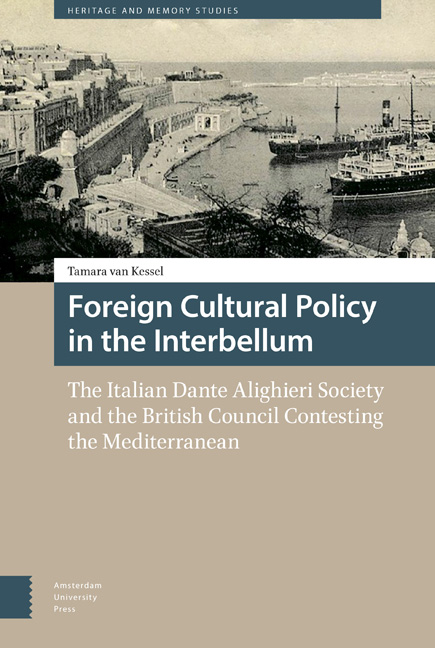 Foreign Cultural Policy in the Interbellum
Foreign Cultural Policy in the Interbellum Book contents
- Frontmatter
- Contents
- List of Illustrations
- Introduction
- 1 The Development of Foreign Cultural Policy
- 2 The Dante Alighieri Society and the British Council: Agency and Independence
- 3 Constructions of ‘Italianità’ and ‘Britishness’
- 4 The Battle for Cultural Hegemony in Malta
- 5 National Culture and Imperial Conquest: The Dante Alighieri Society in Abyssinia and the British Council in Egypt
- Conclusion
- Acknowledgements
- Bibliography
- Index
5 - National Culture and Imperial Conquest: The Dante Alighieri Society in Abyssinia and the British Council in Egypt
Published online by Cambridge University Press: 12 February 2021
- Frontmatter
- Contents
- List of Illustrations
- Introduction
- 1 The Development of Foreign Cultural Policy
- 2 The Dante Alighieri Society and the British Council: Agency and Independence
- 3 Constructions of ‘Italianità’ and ‘Britishness’
- 4 The Battle for Cultural Hegemony in Malta
- 5 National Culture and Imperial Conquest: The Dante Alighieri Society in Abyssinia and the British Council in Egypt
- Conclusion
- Acknowledgements
- Bibliography
- Index
Summary
The Dante Alighieri Society and the British Council were closely involved in Italy and Britain's imperial ambitions around the Mediterranean Sea and its outlets. An analysis of the Dante in Abyssinia and the Council in Egypt shows that, in the growing conflict between Italy's expansionist ambitions and Britain's aim to maintain its empire, organizations for the promotion of national culture abroad played a role in consolidating imperial power, with varying degrees of success. Looking at the nuts and bolts of the cultural activities these two organizations were engaged in reveals the actual practice of cultural policy: what instruments they had at their disposal and to what extent they acted in unison with their respective governments.
In the 1930s, Italy tried to establish firmer control over its colonies in Libya and strengthened its ties with its numerous co-nationals living throughout the Mediterranean area. As of 1935, it embarked further afield in its ambitious colonial expansion by conquering Abyssinia, nowadays known as Ethiopia. The conquest of Abyssinia marked a definite turning point in Italy's image abroad, especially in popular opinion. Upon Italy's invasion of the country on 5 October 1935, the League of Nations could not but condemn this act of aggression against a League member, and in November economic sanctions were imposed. These sanctions, however, were doomed to be ineffective. Vital resources such as oil were exempted, and the British did not deny Italy access to the Suez Canal. The British and French governments still hoped to maintain the semblance of good relations with Italy, as formalized in the Stresa Front agreed upon in April of that year. Both governments held on to the belief that Mussolini could be a potential ally in containing Hitler's power. A deal was made, the Hoare-Laval Plan, which would hand over a major part of Abyssinia to Italy for it to control as some form of protectorate, provided that Italy would end the war immediately. When news of this deal leaked out to the general public in France and Britain, the outrage in popular opinion was such that the British Foreign Secretary Samuel Hoare and the French Prime Minister Pierre Laval were forced to resign.
- Type
- Chapter
- Information
- Foreign Cultural Policy in the InterbellumThe Italian Dante Alighieri Society and the British Council Contesting the Mediterranean, pp. 177 - 224Publisher: Amsterdam University PressPrint publication year: 2016


